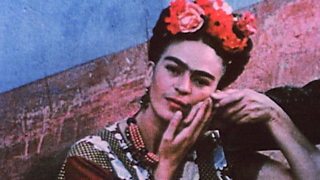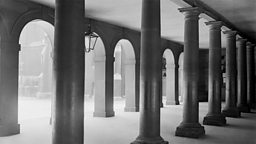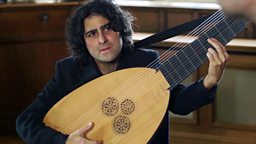The Duchess of Malfi: Five reasons to love this dark classic of Jacobean theatre
15 May 2022
The Duchess of Malfi is a gothic tale of forbidden love, betrayal and murder, and the most frequently performed play of the English Renaissance not written by Shakespeare. This weekend, in �鶹������ҳ��� Arts at the Globe, viewers can enjoy a re-run filmed in a perfect recreation of an early Jacobean theatre at the Globe, starring Gemma Arterton in a role that was memorably performed by Helen Mirren.

1. It was first performed by William Shakespeare's company, The King's Men
The Duchess of Malfi is a tragic, macabre play written by John Webster in 1612-13. First performed by Shakespeare's company, The King's Men, it displays the Jacobean Theatre tradition of stage violence and horror.
After falling out of fashion for centuries, The Duchess of Malfi was revived in 1945 - when its violence and meditations on mortality suddenly felt more real.The Guardian
Webster wrote The Duchess of Malfi during one of the high-points of the English theatre, known as Jacobean theatre - during the reign of James I (1603–25). Shakespeare was still writing major plays until about 1611, but the leading dramatist of the era was Ben Jonson. Other notable Jacobean playwrights included John Marston, Thomas Dekker and Webster.
A drive towards realism and satire in English comedy from around 1610 was matched in Jacobean tragedy by an obsession with moral corruption; Malfi and Webster's The White Devil are examples, displaying a cynical and pessimistic outlook on life and people.


2. Helen Mirren starred in a classic production opposite Pete Postlethwaite and Bob Hoskins
There have been many successful adaptations of The Duchess of Malfi. Notable productions in the modern era include Adrian Noble's 1980 production, with Helen Mirren as the Duchess.
Helen Mirren: ‘mesmerising' as the headstrong heroine.
The Independent said: "Mirren was mesmerising as Webster's headstrong heroine conducting an illicit affair with Pete Postlethwaite, beneath the jealous eye of Bob Hoskins, at Manchester's Royal Exchange."
In this scene, filmed during dress rehearsal in the 1980 production, we see Helen Mirren as the Duchess and Pete Postlethwaite as Antonio.
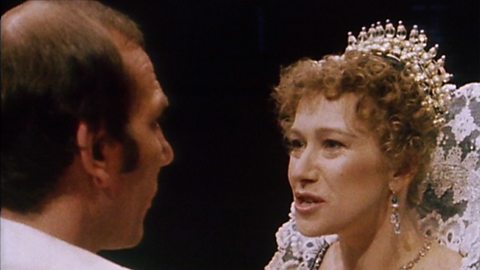
Duchess of Malfi kiss scene,1980 production
Helen Mirren as the Duchess and Pete Postlethwaite as Antonio, dress rehearsal.

3. 'Gemma Arterton is luminous'
Gemma Arterton took centre-stage in the title role of The Duchess of Malfi at Shakespeare's Globe in January 2014.
Arterton brings beauty, determination and moral goodness to one of the great female roles.The Guardian
Directed by the Globe's Artistic Director Dominic Dromgoole, the production was the inaugural performance at the then newly-built Jacobean-style theatre The Sam Wanamaker Playhouse.
Lit entirely by candlelight, the production evokes a murky world of plotting and intrigue.
The Guardian said, ‘Webster's play and this exciting space make a perfect fit.’
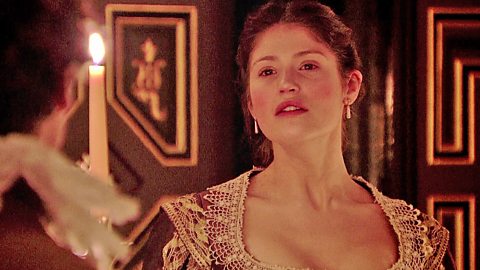
Gemma Arterton as the Duchess of Malfi
The Duchess of Malfi decides to disobey her cruel brothers and woo her young steward

Gemma Arterton on The Duchess of Malfi
Dr James Shapiro talks to the actress about her title role in John Webster's play.

4. Light and shadows: Candlelight illuminates the stage - and a dark moral universe
Andrew Marr introduces this 2014 production of Webster's bloody revenge tragedy.
With its morbid imagery, perverted desires and skulking intriguers, Webster's tragedy showcases the Wanamaker's aptitude for conjuring up the shadowy and the shuddering.The Independent
The production was filmed at The Globe's Sam Wanamaker Playhouse.
It is lit by candlelight in a perfect recreation of an early Jacobean theatre, and evokes a murky world of plotting and intrigue, where even the most pure in heart are caught in a web of murder and revenge.
And below, James Shapiro talks about the radical differences between indoor and outdoor theatre in Jacobean England of the 1600s.
- Watch: The Mysterious Mr Webster, Sunday 22:30
Immediately following The Duchess of Malfi on �鶹������ҳ��� Four and iPlayer, Professor James Shapiro goes in search of the mysterious man behind the play, the son of a coachmaker who ended up rivalling Shakespeare.

Welcome to the world of shadows
Andrew Marr introduces the Duchess of Malfi as a "world of shadows"

The design of Jacobean theatre
Dr. James Shapiro describes the design of theatres in England in the 1600s.

5. Shakespeare's Lutenist: The music of Robert Johnson
If you like early music, you may be familiar with composer Robert Johnson. He served at the courts of James I, Prince Henry and Charles I, and was prolific in the Jacobean Theatre, writing music for Shakespeare's Kings Men group from 1609, including original settings for plays including The Tempest.
Robert Johnson wrote original music settings for Shakespeare plays including The Tempest.
O Let Us Howl is a song written by Johnson around 1613 for The Duchess of Malfi, setting to music the words of John Webster.
The song is performed in Act IV, Scene II of the play. It is for deep baritone or bass and ten-string lute. It precedes speeches and by a group of madmen.
It features stylistic ornamentation and effects designed for the scene, notably the chromatic 'howls'. This performance, by musician, actor and director Tom Guthrie, is accompanied by Yair Avidor playing a type of lute called a .

The Music of Malfi: O Let Us Howl
Robert Johnson’s song performed by Tom Guthrie, accompanied by Yair Avidor on theorbo.
- Watch: Music of Malfi performances - Dance of the Madmen
A dance performed by eight madmen opens Act IV, Scene II of John Webster's The Duchess of Malfi, following their speeches and a rendition of O Let Us Howl by one of their number.

�鶹������ҳ��� Arts at the Globe
-
![]()
The Duchess of Malfi
Andrew Marr presents this production of John Webster's bloody revenge tragedy The Duchess of Malfi (1614) performed in a perfect recreation of an early Jacobean theatre
-
![]()
The Mysterious Mr Webster
Professor James Shapiro goes in search of the mysterious man behind The Duchess of Malfi, the son of a coachmaker who ended up rivalling Shakespeare
-
![]()
Gemma Arterton as The Duchess of Malfi
Preview Gemma Arterton in the title role of the Globe Theatre's production
More from �鶹������ҳ��� Arts
-
![]()
Picasso’s ex-factor
Who are the six women who shaped his life and work?
-
![]()
Quiz: Picasso or pixel?
Can you separate the AI fakes from genuine paintings by Pablo Picasso?
-
![]()
Frida: Fiery, fierce and passionate
The extraordinary life of Mexican artist Frida Kahlo, in her own words
-
![]()
Proms 2023: The best bits
From Yuja Wang to Northern Soul, handpicked stand-out moments from this year's Proms





